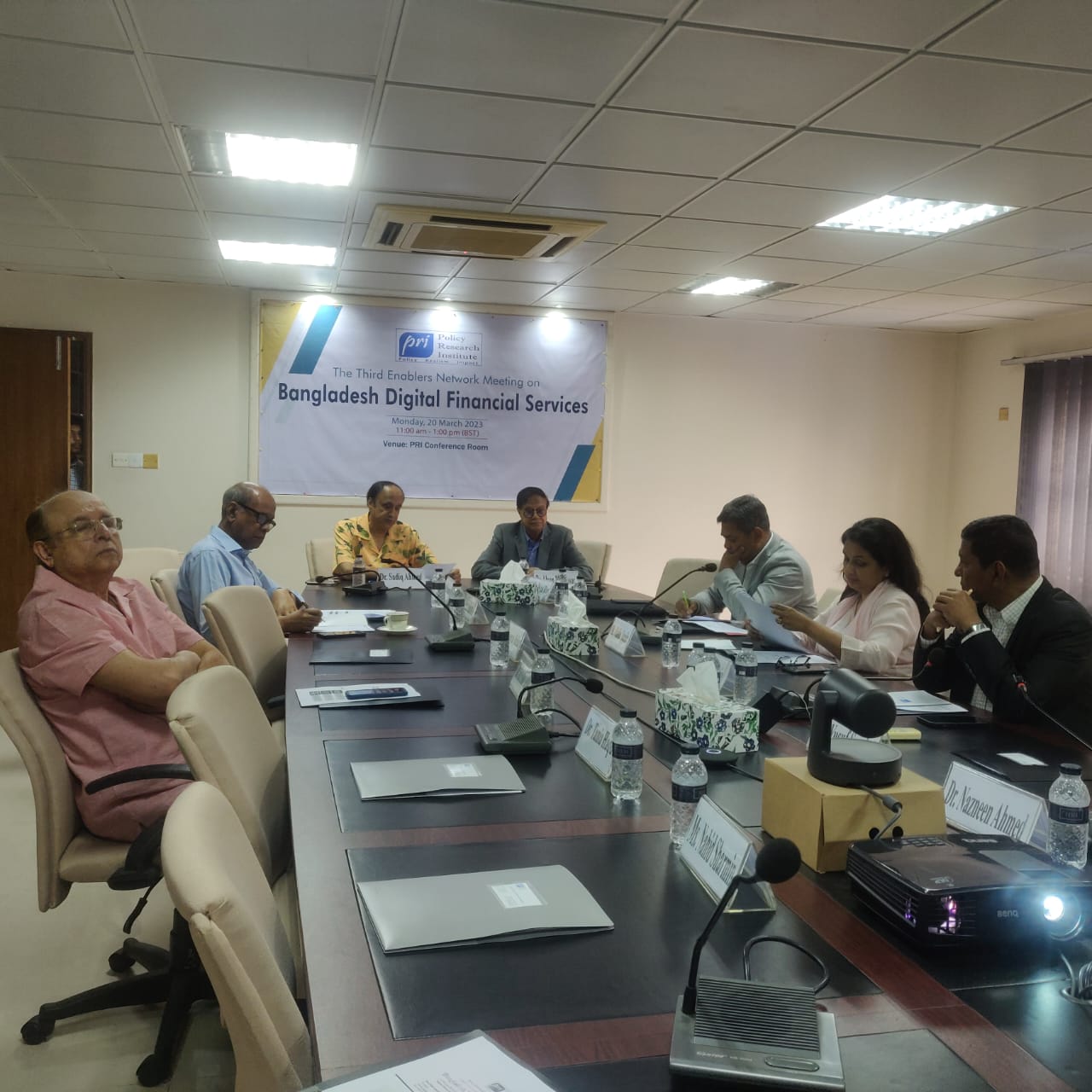The Policy Research Institute of Bangladesh (PRI) organized a National Consultation on Digital Financial Services and Financial Inclusion at the Local Level in Bangladesh on Thursday, 08 June 2023, at the Hotel Sheraton in Banani, Dhaka. The event brought together esteemed public and private sector stakeholders, experts and practitioners, policymakers, and researchers to discuss the adoption and effectiveness of digital financial services among the marginalized population in Bangladesh.
The national consultation was organized as part of the “Policy Initiative for DFS in Bangladesh” project, implemented by Policy Research Institute of Bangladesh, with support from the Bill and Melinda Gates Foundation. Under this project, PRI commissioned three studies last year focusing on DFS use among different marginalized groups in Bangladesh to three universities: Bangladesh Agricultural University, Shahjalal University of Science and Technology, and Hajee Mohammad Danesh Science and Technology University. The key findings from the three studies were presented at the event. Dr. Lila Rashid, Former Executive Director of Bangladesh Bank, Khondoker Shakhawat Ali, Emeritus Fellow at Unnayan Shamannay and visiting fellow at BIGD, BRAC, and Dr. Mohammad Saidur Rahman, Professor at the Department of Agricultural Economics, Faculty of Agricultural Economics and Rural Sociology, Bangladesh Agricultural University joined the event as distinguished discussants.
The event commenced with the welcome remarks from Dr. Ahsan H. Mansur, Executive Director of the Policy Research Institute of Bangladesh. Dr. Mansur highlighted the significance of financial inclusion in combating poverty in Bangladesh and the potential of digital financial services in bringing the unbanked population into the formal financial system to empower them to take control of their financial decisions and build resilience through managing financial risks effectively.
Dr. Bazlul Haque Khondker, Director of Policy Research Institute of Bangladesh (PRI) set the tone of the consultation event by emphasizing the critical importance of engaging with regional and local level stakeholders to generate knowledge and evidence on the use, adoption, and challenges of digital financial services (DFS) for different marginalized communities. Dr. Khondker underscored the need to gather insights and perspectives directly from the communities that are most affected by financial exclusion. By involving stakeholders at the grassroots level, including farmers, socially and economically vulnerable Haor population, and plainland ethnic minority communities, PRI aimed to facilitate a
comprehensive understanding of the realities and intricacies surrounding DFS in Bangladesh. Dr. Khondker highlighted that the objective of the consultation is to ensure that the research and policy recommendations are rooted in the experiences and needs of the people, thus paving the way for more targeted and impactful interventions in the future.
In the event. Dr. Md. Akhtaruzzaman Khan, Head of the Department of Agricultural Finance and Banking at Bangladesh Agricultural University, presented a research paper on the "Adoption and Potency of Digital Financial Services among Farmers in Bangladesh," highlighting the role of digital financial services in empowering farmers and enhancing the agricultural sector. Digital financial services are critical in the agriculture sector, providing multiple benefits and addressing a variety of difficulties encountered by farmers. The study involved a survey with 400 farmers from livestock, fisheries, crops, and horticulture. The study found that bKash (82%) is the most popular DFS product among the respondent farmers, followed by Nagad (30%) and Rocket (23%). DFS is most commonly used for utility bill payments as the payment amount is comparatively small and incurs low transaction fees. Poultry and fish farmers, for example, utilize DFS mostly to purchase feed, chick/egg/fingerlings, and medicine/insecticide, and they also use DFS on a modest scale to obtain payment for selling output. Yet, farmers prefer cash over DFS to avoid the risk of transacting large amounts of money. Farmers that utilize DFS confront acute problems like scams, followed by password loss, transaction failure, personal information theft, and hidden charges. Greater prioritizations need to be carried out for solving these problems by DFS providers so that the farmers can concentrate more on using DFS products in the future.
The audience benefited from the reflections of Dr. Mohammad Saidur Rahman, Professor at the Department of Agricultural Economics, Faculty of Agricultural Economics and Rural Sociology, Bangladesh Agricultural University, who provided valuable insights on the paper as a distinguished discussant.
The second study in the event on "Access to Digital Financial Services for the Plain Land Indigenous Population in Northern Bangladesh" was presented by Asrafi Bintay Akram, Associate Professor at the Department of Sociology, Hajee Mohammad Danesh Science and Technology University. In her presentation, Ms. Akram shed light on the challenges and opportunities in providing digital financial services to the plainland ethnic minorities of Santal and Orao communities in Rangpur and Rajshahi divisions of northern Bangladesh. The study surveyed 749 individuals from the Santal and Orao communities and found that only 77% of respondents own mobile phones. The percentage of mobile phone ownership is even less among women (only 31%). Although a vast majority (84%) opened MFS accounts with help from MFS agents, only 42% currently use MFSs. Three quarter of male respondents (75%) actively use MFSs, compared to only 25% female respondents. A major reason for not being able to use MFSs among the respondents is lack of literacy or formal education. Only 35% of the respondents completed secondary education and use of MFS is higher among more educated respondents. 27% of the respondents lack knowledge and awareness about MFS. Those who use MFSs, mostly use it for receiving SSNP transfer payments or remittances, and utility bill payment. Reasons behind not preferring MFSs include fear of security of money, MFS transaction and cash-out fees, and mobile and internet network disturbances.
Khondoker Shakhawat Ali, Emeritus Fellow at Unnayan Shamannay and visiting fellow at BIGD, BRAC University, provided thoughtful reflections as a distinguished discussant on the topic of financial services for the plain land indigenous population.
Dr. Md. Nazrul Islam, Professor at the Department of Business Administration, Shahjalal University of Science and Technology presented findings of the study on "Impact of Digital Financial Services on Poverty of Haor People in Bangladesh: Expansion and Deepening Approach," emphasizing the potential of digital financial services in uplifting the lives and livelihoods of the Haor population. The study found that 65.66% of haor respondents owned bank accounts, and 64.66% of respondents had accounts with NGOs. Most of the respondents (81.33%) were found to be aware of or have knowledge about M/DFS. Among the respondents with M/DFS knowledge, 52.37% owned and used their accounts independently, while 45.65% used their accounts with the help of others, and 1.98% did not have their own accounts and used others' accounts. The study also highlighted the first usage case of M/DFS, with 68.30% of respondents receiving money, 17.04% sending money, and 11.28% receiving social safety net program benefits. The majority of respondents (69.37%) had M/DFS retail agent outlets located within a distance of two kilometers from their homes. The study also found that only 15.54% of respondents made payments through M/DFS in the year 2020-2021, mostly for mobile/ internet bills and purchase from stores. The study identified several barriers to M/DFS usage, including complexity of transactions (25.39%), unavailability of mobile phones (14.87%), lack of guidance on M/DFS usage (13.42%), unavailability of electricity (12.69%), and absence of a photo (10.70%).
The reflections from distinguished discussant Dr. Lila Rashid, Former Executive Director of Bangladesh Bank, provided valuable perspectives on the DFS use among Haor population, enriching the discussions further.
The event included an open floor discussion and a dynamic question-and-answer session, where the audience actively engaged with the speakers, exchanging ideas and insights.
Ms. Snigdha Ali, Bangladesh Country Lead, Financial Services for the Poor Team, Bill & Melinda Gates Foundation, and Dr. Sadiq Ahmed, Vice Chairman, Policy Research Institute of Bangladesh graced the event as Special Guests.
The event provided a platform for meaningful dialogue and knowledge exchange on the potential of digital financial services in promoting financial inclusion in Bangladesh. The event ended with closing remarks and the organizers expressing gratitude to all participants for their valuable contributions and insights.

The third enablers' network meeting of Policy Advocacy Initiative for DFS in Bangladesh project (phase-II) was held on 20 March 20...

The Policy Research Institute of Bangladesh organized a Regional Workshop on Digital Financial Inclusion at the Local Level in Ban...
The Policy Research Institute of Bangladesh (PRI) organized a National Consultation on Digital Financial Services and Financial In...
